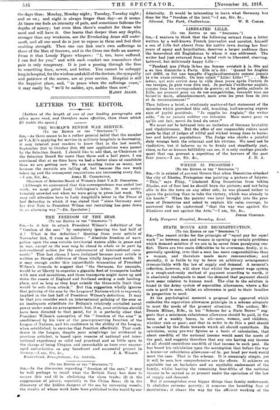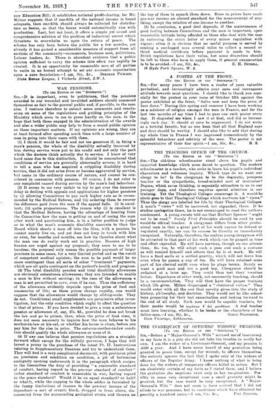STATE BONUS AND RECONSTRUCTION.
[To Taz EDITOR or THE " SPEOTATOR."3 SIR,—The reoent strike for the principle of "equal pay for equal work " as between men and women is opening up certain problems which demand solution if we are to be saved from paralysing con- flict. There are two main difficulties to be overcome; firstly, it is, generally speaking, true that a man has more responsibilities than a woman, and therefore needs more remuneration; and secondly, it is futile to try to force an arbitrary arrangement irreconcilable with the law of supply and demand. A moment's reflection, however, will show that whilst the present wage system is a rough-and-ready method of payment according to worth, it is absolutely inadequate to meet the demand that payment should have some relation to human need. The clue to the solution is found in the Army system of Reparation allowances, where a fiat rate is paid to men, whilst an allowance is paid to their families in proportion to need.
At the psychological moment a proposal has appeared which embodies the separation allowance principle in a scheme adequate to meet the needs of the present situation. The author, Mr. Donnie Milner, B.Sc., in his " Scheme for a State Bonus " sug- gests that a minimum subsistence allowance should be paid, in the form of a weekly bonus, to all—men, women, and children, whether rich or poor; and that in order to do this a pool should be created by the State towards which all should contribute. He calculates, using pre-war figures as a basis of oaloulation, that about one-fifth of the national income would meet the needs of the pool, and suggests therefore that any one having any income at all should contribute one-fifth of that income to such pool. He has based his calculation upon the assumption that before the war a bonus—or subsistence allowance—of 5s. per head per week would meet the case. That is the scheme. It is amazingly simple, yet it will be seen how comprehensive are the effects. It achieves an equitable tax on bachelors and' an equitable endowment of the family, whilst leaving the remaining four-fifths of the national income to be earned as at present under the operation of the law of supply and demand.
But it accomplishes even bigger things than family endowment. It abolishes extreme poverty; it removes the haunting fear of destitution ; it clears the way for the efficient working of the new Education Bill; it establishes national profit-sharing, for Mr. Milner suggests that if one-fifth of the national income is found adequate, then one-fifth should always be collected for distribu- tion as bonus, so that the bonus would automatically rise with production. Last, but not least, it offers a simple yet sound and comprehensive solution of the problem of industrial unrest which threatens to overwhelm us upon the return of peace. The scheme has only been before the public for a few months, yet already it has gained a considerable measure of support from all sections of the community—eoonomists, business men, politicians. Labour leaders, &c. There is abundant evidence that a public opinion sufficient to carry the scheme into effect can rapidly be created. It is an opportunity for reasonable men of all parties to unite in an honest attempt to set our economic organization



































 Previous page
Previous page